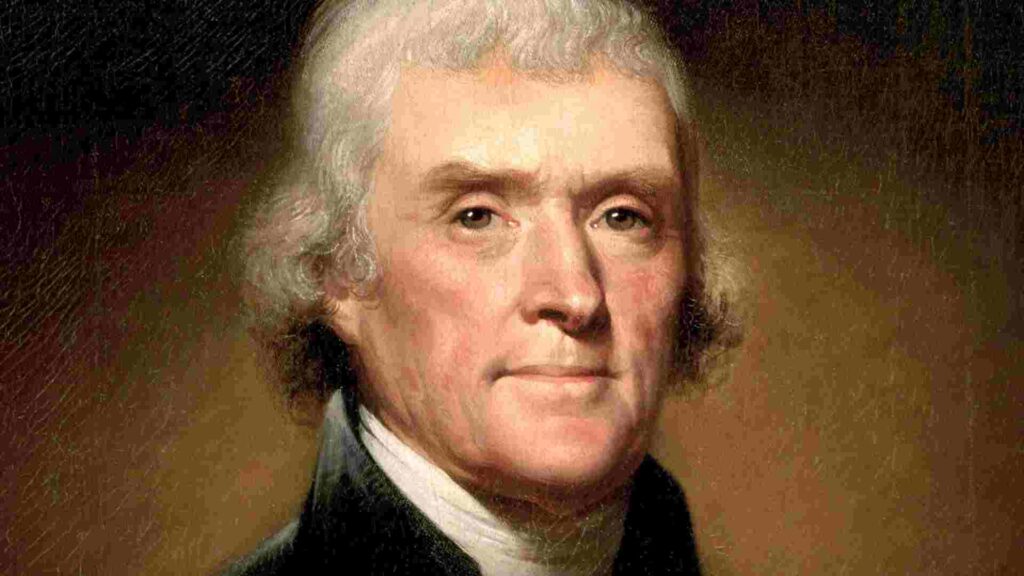Early Life and Education
Thomas Jefferson was born on April 13, 1743, at Shadwell, his family’s plantation in the Colony of Virginia. His father, Peter Jefferson, was a surveyor and plantation owner, while his mother, Jane Randolph Jefferson, came from a prominent Virginia family. Growing up in a well-to-do family, Jefferson had access to education and resources that were not available to many of his contemporaries. His early education was overseen by private tutors, which was common among wealthy families of the time. Jefferson showed an early aptitude for learning, particularly in subjects like Latin, Greek, and mathematics.
At the age of 14, he enrolled at the College of William & Mary in Williamsburg, Virginia. There, he studied a broad curriculum that included the classics, philosophy, and the natural sciences. His time at the college was marked by a deep engagement with Enlightenment ideas, which would later influence his political philosophy. Jefferson’s academic interests were wide-ranging, and he developed a lifelong passion for the study of history, law, and science.
After graduating from William & Mary in 1762, Jefferson pursued a legal career under the mentorship of George Wythe, a prominent lawyer and professor. During this period, Jefferson’s legal studies provided him with a strong foundation in constitutional law, which would become crucial to his later work in American politics.
Early Political Involvement
Jefferson’s foray into politics began with his election to the Virginia House of Burgesses in 1769. As a member of this colonial legislature, he became actively involved in the growing resistance against British rule. Jefferson’s early political writings, including his “Summary View of the Rights of British America,” articulated a vision of American independence and self-governance that would later be reflected in the Declaration of Independence.
In 1775, as tensions between the American colonies and Britain escalated, Jefferson played a key role in organizing local resistance. His efforts were part of a larger movement among American colonists who sought to assert their rights and challenge British authority. Jefferson’s contributions during this period helped to establish him as a leading advocate for American independence.
Role in the American Revolution
The American Revolution marked a pivotal period in Jefferson’s career. In 1776, Jefferson was appointed to the Continental Congress, where he was tasked with drafting the Declaration of Independence. The Declaration, a document that articulated the colonies’ right to self-govern and reject British rule, was adopted on July 4, 1776. Jefferson’s eloquent prose and philosophical grounding in Enlightenment principles helped to shape this foundational text of American democracy.
During the Revolutionary War, Jefferson served as the Governor of Virginia from 1779 to 1781. His tenure as governor was marked by challenges, including the British invasion of Virginia. Jefferson’s leadership was tested during this time, as he faced difficulties in managing the state’s war effort and dealing with logistical and financial issues.
Post-Revolutionary Contributions
After the Revolutionary War, Jefferson returned to his agricultural interests at Monticello and began working on various political and intellectual projects. In 1784, he was appointed as the American minister to France, where he spent several years observing and engaging with European political and social developments. His time in France deepened his understanding of international relations and further influenced his political ideas.
Upon returning to the United States, Jefferson was elected to the newly formed Continental Congress and played a significant role in drafting the Articles of Confederation, the first constitution of the United States. His contributions to this document reflected his commitment to a decentralized federal system that preserved states’ rights.
Presidency and Political Philosophy
Jefferson’s political career reached its zenith with his election as the third President of the United States in 1800. His presidency was marked by a focus on reducing the national debt and limiting the powers of the federal government. Jefferson’s vision of a more agrarian and decentralized nation was evident in his policies and decisions during his time in office.
One of the most significant accomplishments of Jefferson’s presidency was the Louisiana Purchase in 1803. This acquisition of French territory nearly doubled the size of the United States and provided vast new lands for exploration and settlement. The purchase was a landmark event in American history and significantly altered the country’s trajectory.
Jefferson’s presidency also saw the Lewis and Clark Expedition, which was commissioned to explore and map the newly acquired western territories. The expedition provided valuable information about the geography, flora, and fauna of the American West and laid the groundwork for future westward expansion.
Later Years and Legacy
After serving two terms as president, Jefferson retired to his estate at Monticello in 1809. In his later years, he focused on his interests in education, science, and architecture. He founded the University of Virginia in 1819, which he considered one of his greatest achievements. Jefferson’s vision for the university included a commitment to public education and the promotion of intellectual inquiry.
Jefferson’s legacy is complex and multifaceted. He is celebrated for his contributions to American independence and the founding principles of democracy. However, his legacy is also marred by his ownership of enslaved individuals and the contradictions between his ideals of liberty and his practices. Jefferson’s life and career reflect the complexities of early American history and the ongoing challenges of reconciling ideals with actions.
Jefferson passed away on July 4, 1826, the same day as John Adams, marking the 50th anniversary of the Declaration of Independence. His death was widely mourned, and he is remembered as one of the most influential figures in American history. His contributions to the founding of the United States and his impact on political thought continue to be subjects of study and discussion.
